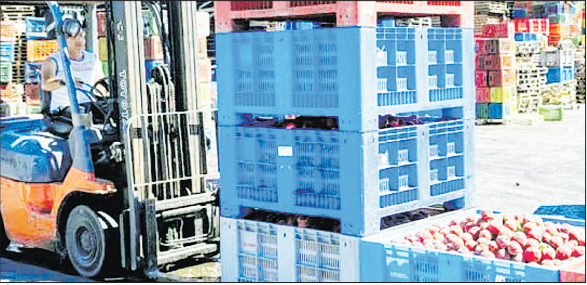
Needed: Efficient infrastructure for agro export
- Agriculture
- No Comment
- 321

Globally, efficient, low-cost trade logistics is recognised as an essential factor in agro export competitiveness. Local and international markets are demanding more quality services in all areas, including transportation of agro exports.
Against this backdrop, Nigeria’s capacity to move and connect exporters with international markets around the world is still low. It ranked 91 in the Index of Trade Logistics Performance (LPI) of the World Bank.
The congestion on roads, at airports and aseaports, high logistics costs, inadequate infrastructure, distorted logistics service markets, and fragmented governance hamper freight, further eroding the nation’s competitive edge.
For experts, improving Nigeria’s logistics performance provides an opportunity to increase its world market share in agro exports, expand into new markets, and diversify its agriculture into high-value products. Thus far, Nigeria has not managed to achieve significant gains.
For instance, transporting fresh produce in excellent condition till they arrive on the consumer’s table or importer’s destination has not been easy.
With fertile agricultural land and a large pool of human resources, the Southwest and Eastern region’s competitive advantages for agro industry have enabled the expansion of one of the nation’s important segments. The regions have some of the top producers of fresh fruits and vegetables. This presents an opportunity for farmers and entrepreneurs, in and around the regions, to boost agro-exports.
Despite this, the segment has lagged behind in reaching its full potentia due to insufficient logistics networks.
Considering enormous trade prospect offered by the regions, the Director-General, African Centre for Supply Chain (ACSC ) Dr. Obiora Madu, noted that the nation’s congested transportation and often unsophisticated logistics systems imposed high costs on the economy. He stressed that making the system efficient, can significantly optimise its connectivity, business environment, and competitiveness.
According to him, efficient logistics has become one of the main drivers for global trade competitiveness and export growth and diversification.
Madu noted that the expected growth in agriculture and export markets also called for increased attention to logistical efficiencies at the ports and other transportation modes.
According to him, reforms and investments for better transport and logistics will yield substantial economic benefits and strengthen its competitive advantage.
In February, ACSC held a round table, where the Lagos logistics ring was highlighted as a major port nerve that spans through Apapa-Iganmu-Orile-Mile-Tin Can-Apapa.
Speakers at the event were the Director-General, Lagos Chamber of Commerce & Industry, Dr. Muda Yusuf; Director, Consumer Affairs, Nigeria Shippers Council, Chief Cajethan Agu; and Chairman, Presidential Taskforce on Apapa, Hon. Kayode Opeifa, among others.
They advocated for a functional logistics hub that would deal with complex transportation flows,while it must lower cargo waiting and movement times.
Agro cargo airports
For Obiora, what Nigeria needs is an airport-based temperature-controlled facility for processing and storage of agro products. He sees airports as a large gateway for the movement of agro products.
For stakeholders, the establishment of agro airports would be a milestone in the development of a cool logistics corridor for the export of fruit, vegetables and other perishables.
In line with this, Ogun government is constructing an agro-cargo airport. The Governor, Dapo Abiodun, said the agro-cargo airport project, conceptualised by the Gbenga Daniel administration in 2007, had lots of potential in the overall development of the state in particular and the country in general.
Abiodun noted that what Ogun was yearning for was an airport that would support its massive agro development potential.
Also, the construction of Ekiti Agro-Allied Cargo Airport in Ekiti State has begun. This is after the Governor, Dr. Kayode Fayemi, handed over the site to the main contractor, CCECC Nigeria Limited. During the site handover, Fayemi described the project, which mainly entailed the construction of 3.2 kilometres runway, as a promise made and kept for the development of the state.
According to him, the construction of the airport’s runway pavement would be completed within 15 months, in line with the timeline agreed with the contractors.
One facet of the efforts to improve agro supply chain across the country is the expansion of warehousing and storage capacity for commodities.
Since Nigeria is one of the largest exporters of leading agro commodities, a consultant to the World Bank, Prof Abel Ogunwale, is urging for the establishment of more facilities for storage and export of a wide range of agricultural produce.
He said the Federal Government should support the establishment of a freight network to boost agricultural and fisheries exports.
He noted that the government needs to rollout a freight export service network, aimed at re-establishing global supply chains and accelerate exports of agricultural and fisheries exports to key overseas markets. In many contexts, he noted that lack of infrastructure, investment and proper knowledge pose a major challenge to smooth logistics processes.
Written by: Daniel Essiet, The Nation
Read more: https://thenationonlineng.net/needed-efficient-infrastructure-for-agro-export/





